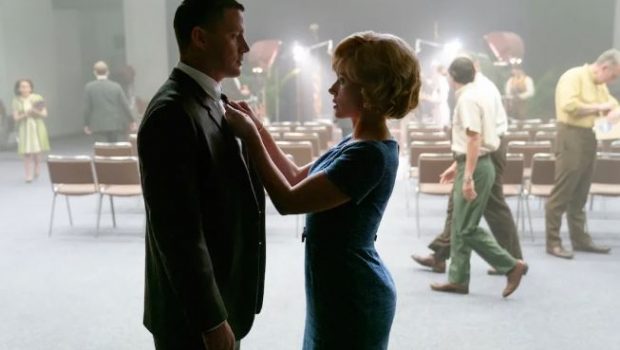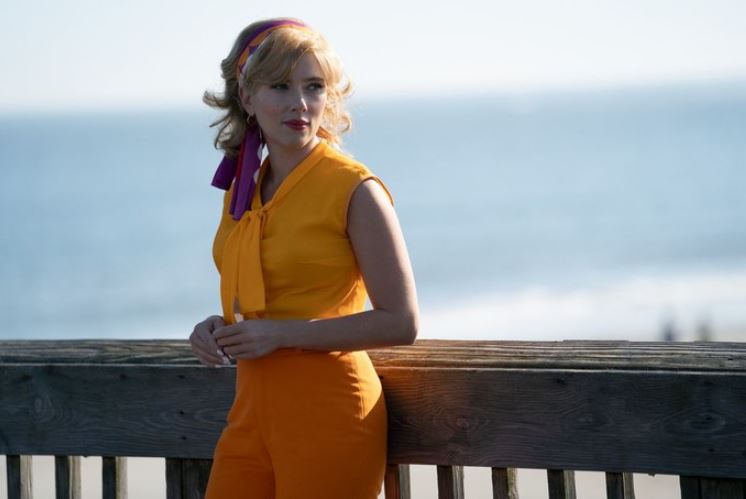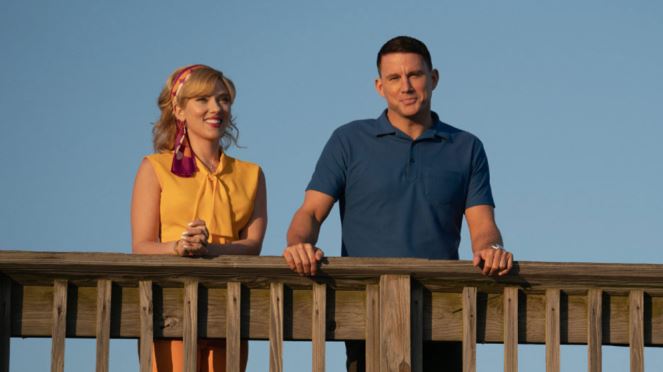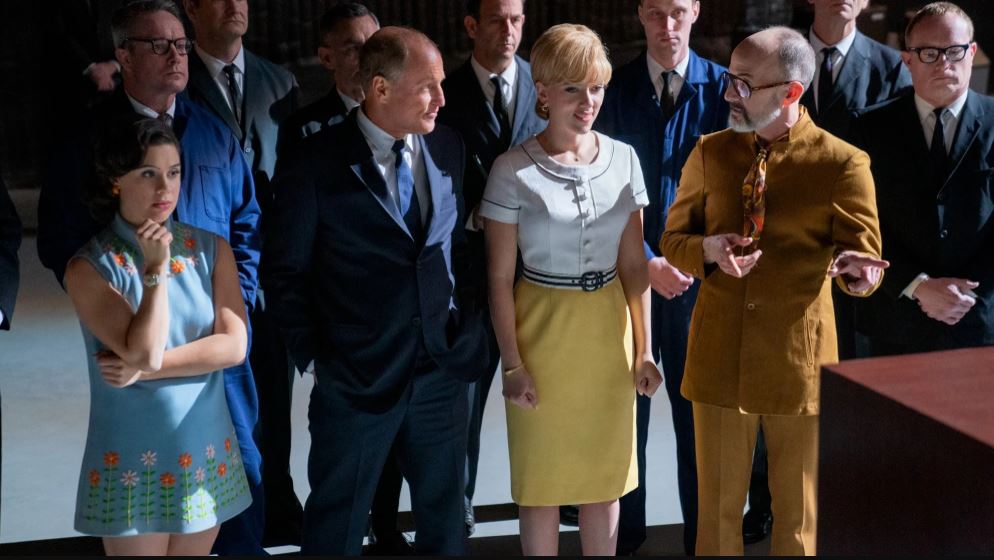Fly Me to the Moon – Film Review
Reviewed by Damien Straker on the 27th of July 2024
Sony presents a film by Greg Berlanti
Screenplay by Rose Gilroy
Story by Bill Kirstein and Keenan Flynn
Produced by Keenan Flynn, Sarah Schechter, Scarlett Johansson, and Jonathan Lia
Starring Scarlett Johansson, Channing Tatum, Jim Rash, Anna Garcia, Donald Elise Watkins, Noah Robbins, Colin Woodell, Christian Zuber, Nick Dillenburg, Ray Romano, and Woody Harrelson
Cinematography Dariusz Wolski
Edited by Harry Jierjian
Music by Daniel Pemberton
Rating: M
Running Time: 130 minutes
Release Date: in the 11th of July 2024
You can thank your lucky stars and stripes for Scarlett Johansson. She prevents this likeable, harmless, but frivolous film from cratering. Her casting is a nice reminder that her range extends beyond the one-dimensional action roles she tussled with in The Avengers (2012), Ghost in the Shell (2017), and Black Widow (2021). Her dramatic prowess was true in Noah Baumbach’s Marriage Story (2019). The film showed her emotional depth and proved again that she can embody nuanced roles. It is still the best performance of her career and worth revisiting. Now with this film she recalls her comedic chops, which might also prompt a rewatch of Ghost World (2001). It marked a fun comedy vehicle from early in her career. Here in Fly Me to the Moon she shows again how funny, smart, and resourceful she can be. The material is not earthshattering or stimulating. However, the comedic elements are enjoyable enough for a pleasant diversion. A stronger resolution and a shorter running time would have made the entire vehicle an easy recommendation, but Johansson’s performance will have to suffice.
The film is an unusual mixture of screwball comedy and science fiction drama. In 1969, Kelly Jones (Johansson) is a marketing expert who early on holds her own against a room full of male executives. She then has a chance encounter with a fellow in a diner who stops her folder from catching fire. His name is Cole (Channing Tatum) and he is working to prepare NASA for the Apollo 11 Moon Landing. While the attraction is brief but immediate, the two go their separate ways. You will never guess where Kelly’s next big marketing assignment is. Just like the husband and wife in Adam’s Rib (1949) who were both lawyers that opposed each other on the same case, Kelly and Cole must collaborate at NASA. His uptight, detail-driven focus on the mission is suddenly countered by Kelly’s wild marketing strategies that will help sell the space mission to the public. The dark underlining of her involvement is that she is being pressed by the government, including a shadowy figure named Moe (Woody Harrelson), to win the Space Race. However, his demands are increasingly outlandish and soon result in Kelly hiring a fussy film director (Jim Rash, hilarious) to shoot their own version of the Moon Landing. Moe stresses that the US cannot lose face by having the mission fail and wants to use the fake Moon landing in case anything goes awry.
As with any romantic comedy, the film is about two vastly different viewpoints that clash but inevitably come together. Kelly is a marketing expert who pretends to be pregnant with a cushion stuffed under her jumper to outwit a room full of crusty old men. She has some fun early moments with her marketing techniques too. One of which involves having the astronauts pose wearing Omega watches. More radically, she has actors playing some of the NASA staff on television, so they appear more personable. Its funny when one of them, played by Ray Romano, sees his fake self on screen giving a press conference. Cole also accidentally bumps into his double in a corridor. All these scenes are breezy and enjoyable as silly as they are. However, there is a darker backstory about how Kelly is not who she says she is and how the government is using this as leverage to strongarm her. Why would the government rely on someone so elusive to handle one of the most significant moments in modern history? Could they not pay an entire agency to do the same job in secret? Talk about science fiction. At least Cole isn’t spared a little bit of backstory and psychology though. His grief over the failed Apollo 1 mission accounts for how protective he is of the mission and the astronauts. When it is suggested that the astronauts should film themselves using special equipment, he reminds Kelly that all equipment on board is accounted for. We are told that even the screws need to be weighed before they can be included. Though if he is blamed for the previous disaster, why is he still in charge of a major operation? If he has such strong attention to detail, how does he not know a fake movie is being shot under his nose? Never mind. It’s all implausible, but the film deserves credit for at least trying to add dimensions to the characters so we understand what has shaped them and why they are at odds.
This is the fourth film from filmmaker Greg Berlanti, who previously directed Life as We Know It (2010) and Love, Simon (2018). He had a hand in writing the films Green Lantern (2011) and Wrath of the Titans (2012). His background also includes developing several superhero television shows. Unsurprisingly, his film is competently assembled even though its depiction of the period resembles a glossy comic book. One highlight for Berlanti’s production is the crisp cinematography by Dariusz Wolski (a frequent collaborator of Ridley Scott). The scale of the NASA launch site is impressive and some of the outdoor shots of the desert are well framed. Regarding tone, the screwball comedy parts are the most enjoyable because of how fluidly Berlanti and Wolski move the camera and how they keep the energy light and funny. Some reviews have cited awkward tonal shifts where the mood changes from frivolous to a dark personal drama. Isn’t it better though to at least try and add weight? Even the best screwball comedies, including His Girl Friday (1940), are buoyed by dark edges to counter the breezy humour. This film is not in the same ballpark, carpark, or stratosphere as those classics but its intentions around the characters are good. Berlanti is far less effective at building suspense sequences. It could be because there is already such a strong pedigree around space films that it is hard to stand out. Capricorn One (1977) was already about staging a fake mission to Mars. The Dish (2000), Interstellar (2014), Hidden Figures (2016), First Man (2018), Apollo 11 (2019), and Apollo 10 ½ (2022) have given audiences their fill too. This might account for why the generic ‘will they or won’t they use the real footage?’ climax feels so by-the-numbers and unremarkable. Even the realism of the science is discarded when a camera is rushed onto the ship at the last second. The lightweight comedic elements work best because it does not feel like it is once again retreading old ground.
The film is serviceable because it’s easy blend of comedy and drama makes it perfectly watchable. A large part of this enjoyment is attributable to Scarlett Johansson’s energetic performance. Her work encapsulates her ability to switch between different moods and genres, which is something she has done well for much of her career. Her comedic scenes work a lot stronger than the generic scientific plot in the backend. Maybe this is why the film has despite its best efforts suffered a soft return at the box office. Its nostalgia and star power aside, it failed to retake its $100m budget. Audiences know there are other world achievements that can be dramatised besides the Space Race. Nonetheless, the humour in the early sections makes for a breezy if unremarkable viewing and the backstories show the filmmakers trying to add more character depth than usual.
Summary: You can thank your lucky stars and stripes for Scarlett Johansson. She prevents this likeable, harmless, but frivolous film from cratering.










